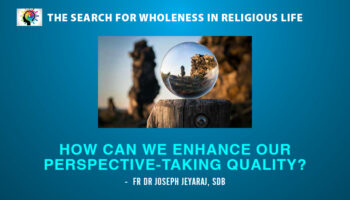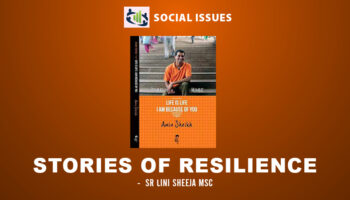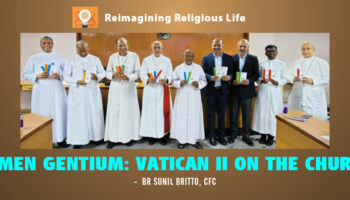What do today’s young people expect from the Church?
How can we reach out to youth, help them in areas where they need help, and welcome the huge contribution they are able to make?
A Synod (a special international meeting of Catholic bishops) meets this month in Rome. Theme: Youth, Faith and Discernment.
The preparations have been afoot for over a year.
In March, the church representatives met with hundreds of youth—and listened.
This itself is a change—to listen to youth, rather than just preach to them or advise them. Young people are not children. They not simply the future, as we used to say. They are—and should be—a significant part of our present, both in the Church and in secular society.
The Church prepared a detailed questionnaire on the situation and questions of youth, and received many thousands of replies.
The Synod will include a representative sample of young people—a first for a Synod.
We—church personnel, parents, teachers, so-called experts, etc.—should not forget that what we call progress in any field was usually the fruit of young people challenging the status quo and the established wisdom—whether it was a young Rabbi called Jesus, or a young deacon called Stephen, or a rebellious young son later called Francis of Assisi, a young sister called Teresa in Kolkata, or young inventors like Steve Jobs or Bill Gates or Mark Zuckerberg—who changed the world around us. Without the questioning and the so-called rebellion of the young, nothing new would have happened—in any field.
Is the Church aware of the enormous potential of this group, and serious about tapping its extraordinary energy, ideas, ideals and passion? Or do “Church people” (bishops, priests, religious and senior lay persons) see the young only as beneficiaries of our ministry, to be told what to do, but to whom we need not listen? Some may even see the young, unfortunately, as problems rather than as a huge reservoir of potential.
When we speak of the “Church,” do we mean both the old and the young, or mostly those who hold special roles and power—Pope, bishops, clergy, religious and a few lay leaders?
In this short article, I shall try to summarize what I see as the expressed and often silent pleas and demands of today’s young people. My line of thinking is based on decades of being involved with the young, including young religious and seminarians, and with helping others in youth ministry.
This is what, in my view, the youngsters want to tell us:
DO’S:
- Listen to us: Pope Francis seems to have understood this cry of youth very well. That is why he wanted those involved in preparing the Synod to send out questionnaires and really listen to what the young want to tell the Church. Far too often, it is a one-way street: Those in authority speak, and expect the young to shut up and listen—as if they had nothing worthwhile to contribute, as if everything will be fine, provided “you just do what we tell you.” This can easily happen in family, or parish youth group, or school or in a religious formation house—to talk without listening, to advise without understanding the other, to think that we know lots (or everything) and the young have nothing of value to contribute. St. Benedict used to say: “Listen to the young; God often speaks to us through them.”
- Include us: The young are as much a part of society or the church or of the religious order as the older members are. Do we include them in the decision-making process? Do we share responsibilities with them? For instance, there are excellent youth teams that organize and conduct prayer services and retreats. There are young graduates who do campus ministry. Peer ministry is a very effective way to reach out to more and young people. The style and tone of Pope Francis and of this Synod seem to be in this direction—not a top-down approach, but really involving everyone.
- Empower us: The young, while being gifted, creative and apparently strong, are generally insecure. They often hide their insecurity through noise, laughter, expertise with gadgets, etc. They need encouragement; they need empowerment. A kind word from a parent or teacher or parish priest or principal goes a long way to build up a young person (“Mary, you really read well,” “Anand, your help in preparing the parish feast made a huge difference,” “Sheela, you have a wonderful way with children,” “Prakash, I am edified to see the way you care for your grandfather.”) Empowering is not only in words, but in giving them opportunities to do things, to shine, to succeed, and thus discover their gifts even more clearly.
- Respect us: We (authority figures or older persons) have no right to humiliate or insult young people, especially in public, or to speak about them in a disparaging manner. Every human being has to be treated with respect. Respect breeds respect, just as crudeness leads to crudeness. In our culture, “respect” is often (and sadly) understood as a special way of behaving towards persons who hold a particular post, not as the basic right of everyone. Just as I expect respect from my students or employees, I need to treat each of them with respect.
- Challenge us: An easy life does not bring out the best in people. A family upbringing or formation setting which is easy-going, undemanding or too comfortable, without sacrifices, duties, insistence on doing one’s work well, being clean, punctual and reliable, will turn us into useless or parasitic adults who cannot hold responsibility, face life, or be dependable. Adults need to set an example of joyful and responsible commitments, and openness to be challenged. From such adults, the young will accept challenges, corrections and even hard demands.
- Show us the way: Each human being is living this journey for the first time. We did not have a trial run! Hence it is only natural that we feel confused, unsure of ourselves and the need for a guiding hand. Even when teenagers and young adults seem to revolt and reject what parents and others in parental roles are telling them, later, especially after they marry, they will quote their parents, favourite teachers and the priests and religious who inspired them. They need loving adults who show the way.
- Tell us why, not only what: When a boy or girl asks, “Why should I go to confession?” or “Why go for Mass?” they are not denying the Catholic faith. They are looking for the meaning of Confession or the Mass. It is wrong to shout at them for that, or to say, “That is your duty as a Catholic!” Today, with a more educated laity, we, clergy and religious, will face more questions: Why get married in church? Why can’t I marry a non-Catholic? Why send my child for Catechism? What about birth control? Questions show interest, not rebellion. It is an opportunity for dialogue, not a provocation for a fight.
- Make serious matters meaningful: The way we celebrate the Eucharist, or hear confession, or have community prayers (for us religious) should show their meaningfulness. They should not come across as dull and meaningless routine, simply imposed by law. If a young religious asks her superiors why to have so many hours of structured prayers, or finds the daily office meaningless, the right response is not that she lacks faith or is proud, or that she is young now and will understand later. Such answers just show that older members have no good reasons for doing what they are doing.
- Make important things interesting: One thing I learnt when I came to the Salesian house was that prayer should be made interesting for boys. There is no reason for imposing on a youth group a type of music that appeals mostly to older people, or to preach or write in a way that puts people to sleep! Just as a good maths teacher makes mathematics interesting, and a good music teacher makes the students fall in love with music, we must do the same with spiritual matters and the more serious pursuits of life, like study, service, community life, common prayer, conferences.
- We want to see you happy: When we were young religious, we used to watch the older members of our community to see whether they looked happy. We felt: If they look happy, it is worth staying in. If they are not happy, why waste our life here? It matters to children to see their parents and grandparents happy. It is very hard growing up in a home where the older members look miserable. The same with religious communities or the tone of a diocese. The tone is set by the superiors and older members, not by the younger ones. It matters for the faithful to see their priests and religious happy. Look at photos of Pope Francis. Doesn’t he come across as a loving and happy man?
DON’TS:
Here are a few don’ts, too. What are the things the young do not want to see in us. These are the things that would put them off, of make them stop coming to church.
- Don’t bluff: Don’t preach one thing and do something else. Be honest. If you make a mistake, admit it, and apologize. If we do not know the answer to a student’s question, don’t pretend to know. Tell them honestly that you do not know, and that you can look for the answer. Then they will trust you. If you try to hide behind clever words, and pretend, they will lose their confidence in you.
- Don’t abuse: Behind all abuse—physical, emotional, sexual or financial—lies the abuse of authority. That is, someone who has more power—because of being a parent, or teacher, or parish priest or lay professional or older—makes use of that power to do harm, not to help. Power is given for doing good. Thus, a parent can use his or her physical strength to carry a sick child; a parish priest can counsel an alcoholic; an adult can help a child to cross the street or to learn music; a policeman can protect a citizen from physical harm or theft. Power puts special responsibility on the one having it. It is a terrible betrayal if we misuse power to do harm to a weaker human being. Thus, we should not tolerate wife-beating, or cruelty towards children, or sexual abuse of minors or employees, or police brutality, or government employees asking for bribes.
- Don’t imitate us: The young want adults as guides, not simply as friends. To chat and have fun and play with, they have their companions. They will tease a class mate with a different hair cut or type of clothes. Hence teenagers tend to conform to the group’s language, dress code, etc. If we, grown-ups, under the mistaken notion of being popular, tried to dress or act or talk like teenagers, they would find that rather silly. A sixty-year-old mother should not try to dress like her twenty-year-old daughter. A priest or religious should not use vulgar language or crack smutty jokes, even when some young people do it. They need us as their models; they will find it ridiculous if we take them as our models. We can, and should, discuss music and sports with them, of course. But they need to see that we have standards we will not lower. Thus, it is fine for a priest or teacher to play basketball with the students; he would be foolish to start smoking in order to be close to them.
- Don’t expect us to be perfect: No one is perfect. No one. Neither the young, nor the old. As one of the great Salesian formators used to tell other formators “The young have a right to be immature. It is we, older people, who should be exemplary.” The young—e.g., our sons and daughters, our students, junior religious, young parishioners—have a right to see greater maturity in us. We have no right to expect them to be mature. It is our “job”—through example, guidance, listening and encouragement—to help them mature. This journey of growth never gets done.
- Don’t bore us: Jesus was not boring. The crowds followed him, even for days, even when they had not eaten. Children liked his company, and came to him. Why do some of us make the Good News so boring! Why are some Sunday sermons so badly prepared and a source of patient suffering than an experience the congregation longs for? Today, with the exposure the young (even more than older people) have to social media, they will switch off if the speaker or writer is not interesting. Gone are the days when the temple festival or the village parish feast was a big social function and a big break in the monotony of ordinary life. Today, there are so many, many competing attractions. Just as we can easily flip TV channels or change what we are watching on the smart phone, our listeners will “switch off” if they are bored.
- Don’t give up on us: There are times when even the best of us gets fed up, discouraged, utterly alone. There are times when we may see nothing worthwhile in our life. We may feel like giving up. How many couples and parents feel discouraged! How many priests and religious feel unappreciated or disillusioned! This is part of human life. This happens to youngsters, too. In fact, behind the noise and the apparent glamour which they at times hide behind, many young people are lonely, insecure, even fed up with life. Some may attempt suicide. Others run away from home, or escape into addictions—alcohol, drugs, pornography, compulsive use of social media. Behind these erratic behaviours is a search for genuine relationships and a meaningful life. When young people feel like giving up, or are afraid of facing life, they need a strong and caring adult hand (and heart) that does not give up on them. Left to themselves, the young can often feel rudderless, lost and utterly alone. They need us—even though they may not say it.
Can, we, who are supposed to bring Jesus’ loving and compassionate message to all, especially the weak and the lost, be the caring and wise adults the young need in their life? Can we be healing balm for their unhealed wounds? Can we help to steady their boat when the sea is rough and they feel rudderless and terrified? Do we take them seriously, learn from them, listen to them, offer them opportunities to use their enormous potential and boundless energy to make a positive difference? We need their enthusiasm, risk-taking courage, spontaneity, freshness of outlook, creative restlessness and endless questioning, just as they need our serenity, wisdom and witness (if we are serene, wise and inspiring adults). May we find each other’s company stimulating, the mutual challenges rewarding and the mutual support a perennial source of strength. Through it all, may the mutual love deepen and widen! That, coupled with and sustained by a deep God-awareness, is what makes us Church.
To read the entire article, click Subscribe






